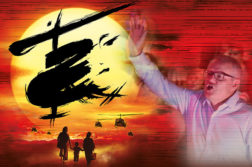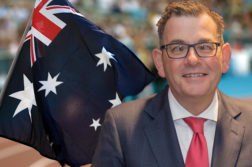As our bus left the curb of a bus station in the Palestinian-controlled city of Nablus, we made a sharp u-turn, narrowly missing a taxi, a boy selling safety pins, and a sleepy-looking grocer. Having been on the roads of several Middle Eastern countries for a month now, nobody in my family flinched.
Instead my sister took out a pop Arabic tape and asked the driver to put it on. A friendly old man, he was delighted by the request and, to the horror of my father who sat in the front seat, turned the volume up allowing everyone from Nablus to Jerusalem to hear. My mother, along with the three passengers sitting behind us, giggled.
The driver looked back and laughed. ‘To Burqa,’ he cried in Arabic. ‘Yallah, Bismila alrahman al rahim’.
It was January 2000. Eight months before the outbreak of the second intifada. It had been thirty-five years since my father had seen his homeland, Palestine. Thirty-five years since he’d travelled through its magical mountains; talked and mixed with its people; seen its beauty and its bitterness. Burqa, his village, had never stopped calling him, beckoning him to return to his land. To make the journey from Melbourne back to the home he was born in.
For my sister and me, Burqa had always been like a fantasy-land, a Palestinian Narnia of our father’s past. We had seen no photos, so our imaginations ran wild with its description. And we had never felt comfortable to talk freely about it because many of our peers had been conditioned to find the reality of Palestine itself bemusing, let alone one of its villages.

Remains of the house in Burqa (author’s photo) |
For more than thirty-five years my father’s roots have been considered irrelevant to a great majority of the people, institutions, media and politicians of the country he has built his family’s home in. We have grown up justifying and explaining the relevance of Palestine.
As soon as we entered it we were overwhelmed to find that here a person’s roots were all that counted. From the hotel concierge in Jerusalem, to the tour guide at the Nativity Church in Bethlehem, to the people that sat beside us in the buses we rode, everybody here understood that there is dignity in being able to claim heritage, in being able to derive identity from an olive tree, a rocky hill, a winding mountain road.
So as soon as my father mentioned the word ‘home’, the bus driver and other passengers came alive with questions:
– Where were we from?
– Australia.
– Australia? But originally?
– Burqa.
– Burqa! Ah! Ahlan wa sahlan! (welcome!)
– How many years since you’ve been away?
– Thirty-five
Gasps a familiar sadness engulfs the bus.
They turn and see my sister with a camera in one hand, and a video camera propped up on her lap, filming every mountain, every Palestinian village, every illegal Jewish settlement.
‘We’re on holiday only,’ my sister answered. ‘Many tourists visiting now’, she added. ‘Huh!’ the young man sitting behind us mutters. ‘We may as well all be tourists in our own home.’ The bus driver smiles at my father. ‘Do not think of what has happened. Just enjoy it while you are here. Welcome home’.
For the rest of the ride to Burqa my father sat upright in his chair, hands tense, legs shaking, eyes drinking in a landscape long missed. As we climbed a steep rocky road our bus driver stopped on the side to let out two of the passengers, a father and son.
After both disembarked, the elderly man popped his head through my father’s window, and asked: ‘How much do you remember?’ My father looked him directly in the eye and answered equivocally: ‘Everything’.
The man nodded. ‘God be with you and your family,’ he said, saluting my father and turning around to join his son. ‘Ameen,’ the bus driver said.
We continued on and, as we passed a dilapidated hut where a small group of children sat upon the remains of a fallen fence, my father suddenly cried out: ‘That hut! It was a police station. Right?’ The bus driver nodded.
Suddenly the dusty and narrow road opened into a fork and my father drew in a sharp breath as the houses towered around us.
‘Burqa ‘ his choked voice whispered. My sister held tight onto the camera, determined to record, confirm, prove the relevance of my father’s heritage.
‘My primary school!’ my father yelled, as we passed a small blue building. Our bus driver sounded the horn and some children playing in front turned to look at us, frantically waving at us as we drove on. As we turned down a gravel road my father gasped as we passed a mosque.
‘The door,’ my father said, pointing to the huge, neglected door. ‘It was majestic, grand. It was painted in a brilliant, honourable green the mosque itself stood so proudly. What happened to it?’ The bus driver shrugged his shoulders and sighed. ‘The same as what happened to all of Burqa. There’s nobody left to look after anything. Nobody allowed to return to look after anything.’
As we drove on my father twisted back, staring at the humiliated ruins of the noble mosque he once knew.
The bus driver suddenly slammed his foot on the brakes, our path cut by a bored looking pony lazily ambling its way across the road and then negotiating its large rear end down through the sloping backyard of a house in ruins. We all burst into laughter, interrupted seconds later by my father who cried out to the bus driver to stop.
‘Wait! Bayti! My house!’ he shouted excitedly. ‘It’s next to that ruined house.’
The bus stopped and we jumped out, the bus driver shaking my father’s hand and waving good bye to us. ‘Salamu Alaykom [peace be upon you],’ he said. My father smiled warmly back at him, holding his handshake tightly, as old friends would. ‘Wa alaykom wasalam [peace be upon you too],’ my father replied. ‘Thank you.’
Donate To New Matilda
New Matilda is a small, independent media outlet. We survive through reader contributions, and never losing a lawsuit. If you got something from this article, giving something back helps us to continue speaking truth to power. Every little bit counts.



